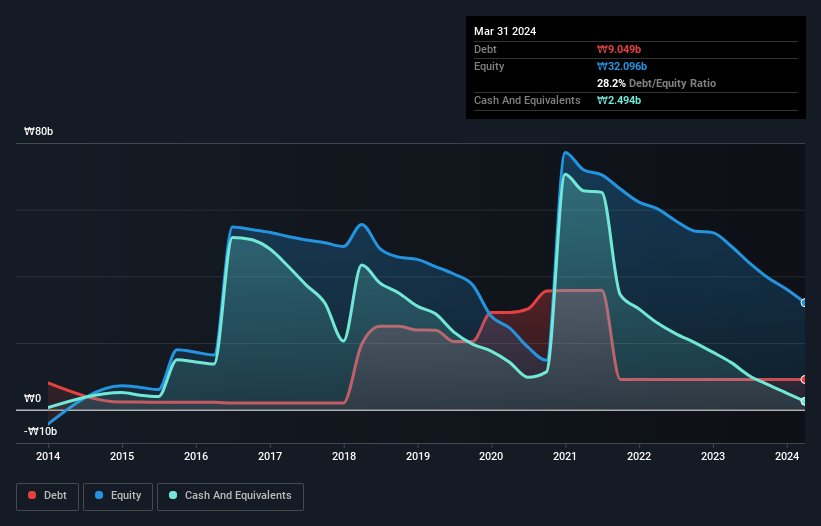
Howard Marks put it nicely when he said that, rather than worrying about share price volatility, 'The possibility of permanent loss is the risk I worry about... and every practical investor I know worries about.' When we think about how risky a company is, we always like to look at its use of debt, since debt overload can lead to ruin. We can see that Peptron, Inc. (KOSDAQ:087010) does use debt in its business. But should shareholders be worried about its use of debt?
When Is Debt A Problem?
Debt assists a business until the business has trouble paying it off, either with new capital or with free cash flow. If things get really bad, the lenders can take control of the business. However, a more common (but still painful) scenario is that it has to raise new equity capital at a low price, thus permanently diluting shareholders. Of course, the upside of debt is that it often represents cheap capital, especially when it replaces dilution in a company with the ability to reinvest at high rates of return. The first step when considering a company's debt levels is to consider its cash and debt together.
Check out our latest analysis for Peptron
What Is Peptron's Net Debt?
As you can see below, Peptron had ₩9.05b of debt, at March 2024, which is about the same as the year before. You can click the chart for greater detail. On the flip side, it has ₩2.49b in cash leading to net debt of about ₩6.55b.

How Healthy Is Peptron's Balance Sheet?
According to the last reported balance sheet, Peptron had liabilities of ₩8.17b due within 12 months, and liabilities of ₩9.65b due beyond 12 months. On the other hand, it had cash of ₩2.49b and ₩951.4m worth of receivables due within a year. So its liabilities total ₩14.4b more than the combination of its cash and short-term receivables.
Having regard to Peptron's size, it seems that its liquid assets are well balanced with its total liabilities. So it's very unlikely that the ₩861.2b company is short on cash, but still worth keeping an eye on the balance sheet. Carrying virtually no net debt, Peptron has a very light debt load indeed. When analysing debt levels, the balance sheet is the obvious place to start. But you can't view debt in total isolation; since Peptron will need earnings to service that debt. So when considering debt, it's definitely worth looking at the earnings trend. Click here for an interactive snapshot.
Over 12 months, Peptron made a loss at the EBIT level, and saw its revenue drop to ₩2.7b, which is a fall of 37%. That makes us nervous, to say the least.
Caveat Emptor
While Peptron's falling revenue is about as heartwarming as a wet blanket, arguably its earnings before interest and tax (EBIT) loss is even less appealing. Indeed, it lost ₩16b at the EBIT level. Considering that alongside the liabilities mentioned above does not give us much confidence that company should be using so much debt. So we think its balance sheet is a little strained, though not beyond repair. However, it doesn't help that it burned through ₩13b of cash over the last year. So to be blunt we think it is risky. The balance sheet is clearly the area to focus on when you are analysing debt. But ultimately, every company can contain risks that exist outside of the balance sheet. For instance, we've identified 4 warning signs for Peptron (2 are significant) you should be aware of.
If you're interested in investing in businesses that can grow profits without the burden of debt, then check out this free list of growing businesses that have net cash on the balance sheet.
New: Manage All Your Stock Portfolios in One Place
We've created the ultimate portfolio companion for stock investors, and it's free.
• Connect an unlimited number of Portfolios and see your total in one currency
• Be alerted to new Warning Signs or Risks via email or mobile
• Track the Fair Value of your stocks
Have feedback on this article? Concerned about the content? Get in touch with us directly. Alternatively, email editorial-team (at) simplywallst.com.
This article by Simply Wall St is general in nature. We provide commentary based on historical data and analyst forecasts only using an unbiased methodology and our articles are not intended to be financial advice. It does not constitute a recommendation to buy or sell any stock, and does not take account of your objectives, or your financial situation. We aim to bring you long-term focused analysis driven by fundamental data. Note that our analysis may not factor in the latest price-sensitive company announcements or qualitative material. Simply Wall St has no position in any stocks mentioned.
About KOSDAQ:A087010
Flawless balance sheet low.
Market Insights
Community Narratives



